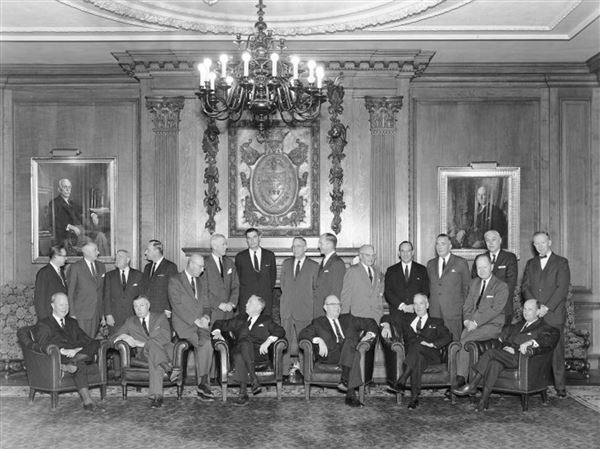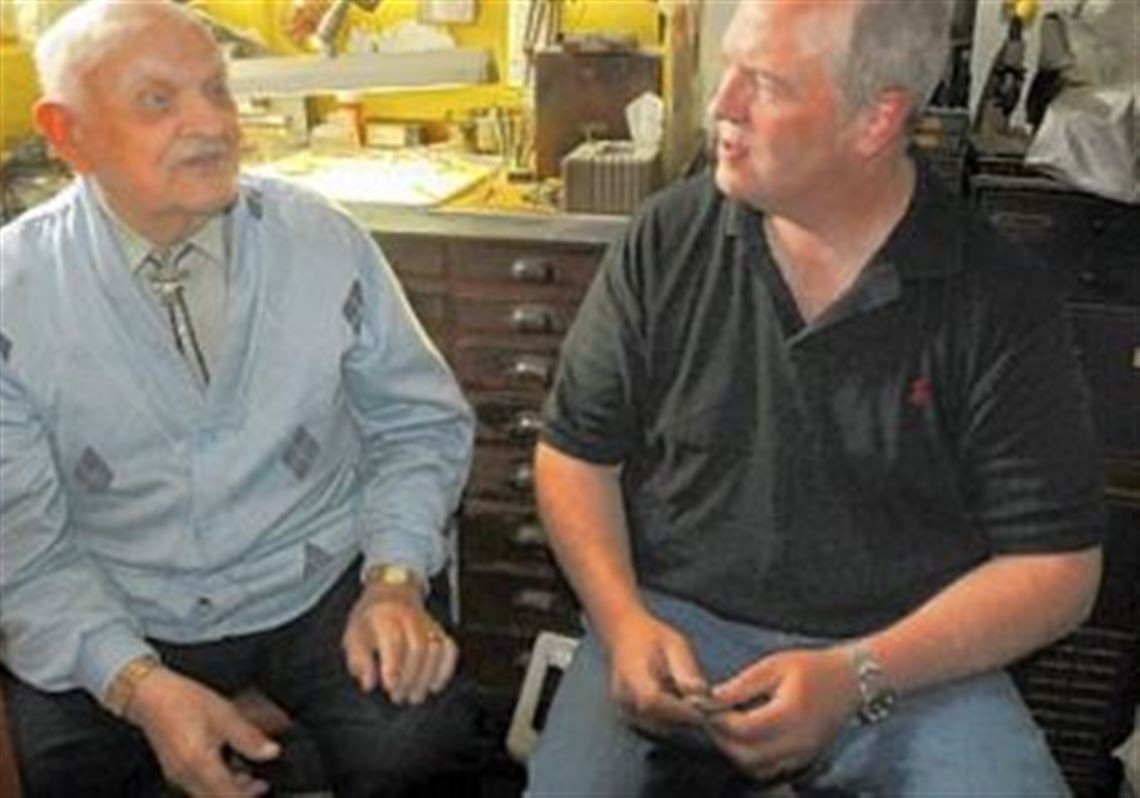Albert Burnelis turned 91 on Saturday, but the same thing that fascinated him as a boy, a ticking watch, energizes him still.
"What makes the doggone thing make the noise and what makes it run?"
Take something that's dead and bring it to life. He learned to resurrect watches as a boy. After serving as a Marine in the Pacific in World War II, he came home to a tight job market and decided to go to watchmaking school.
Now he's a teacher himself.
I was sitting in a cluttered yet highly organized room where it all happens, upstairs in Mr. Burnelis's South Side home. Kieran "Bud" Lynch, 47, who learned everything he knows about the trade from Mr. Burnelis, was telling how they met.
The first time was when Mr. Lynch was a student at Allderdice High School and his father took him to Mr. Burnelis's shop by the Rex Theater on Carson Street. The teenager chose to purchase a half-dozen old watches from the hundreds that were stuffed a foot deep in dresser drawers, and Mr. Burnelis told him, "Come on back in a week and they'll be running."
The watchmaker did as promised, and that set the youth on the path to watch-collecting. Twenty years later, about a decade ago, he went hunting for the old man again, to get two or three old watches fixed, but the shop was gone.
Soon after, Mr. Lynch was bemoaning the fate of his tickless watches in Harry's Barber Shop in Soho, near the northern end of the Birmingham Bridge, and Harry Orlando told him that the watchmaker he sought lived just the other side of the bridge.
Mr. Lynch called Mr. Burnelis and brought the watches to his home. Mr. Burnelis took him up to this room with hundreds of crystals, each uniquely shaped, and countless old watches that could be cannibalized for parts. Mr. Lynch figured he'd be charged a couple of hundred dollars and, indeed, Mr. Burnelis told him, "We're talking a little bit of money here. ... Three, maybe four dollars."
Mr. Lynch was not just a customer. He was a student who'd found an equally eager mentor.
"My hands are not steady anymore," Mr. Burnelis told me, and then tapped the side of his head. "I can do it up here, but can't get it down to the fingers."
In Mr. Lynch, he had a pair of willing hands. The younger man was already selling antiques on eBay; the stuff he'd inherited from his grandmother filled his O'Hara basement. Once he learned how to fix old watches, he widened his inventory and launched Allegheny Antique Watch. He could buy one on eBay for $15, fix it, polish it, and sell it for $150.
"Get a couple of those done per week and you can make your minivan payments and cook some spaghetti," Mr. Lynch said.
He and his wife, Maureen, have three pre-school children with a fourth due in August. Mr. Burnelis is a father of six whose wife, Anjela, died in 1986. He retired when he was 72, and all he wants to do now is hand a younger man parts, tools and knowledge. He has never allowed Mr. Lynch to pay him anything.
"I feel that I did my share and I never cheated nobody," Mr. Burnelis said.
When he came back from the war and took watchmaking classes at the Western Pennsylvania Horological Institute, he recruited enough other students to persuade the school to launch a course on the chronograph watch, which has both timekeeping and stopwatch functions. He was determined to know everything.
He must have been good, because he kept his shop open for 44 years without ever having a phone. He didn't want people calling and asking, "How much for this and how much for that?" When a watchmaker is really on his game, like a poker player with a hot hand, he doesn't want to be interrupted because there will be other days "you get up and you got all these," he said, wiggling his thumbs, "and none of those," wagging his fingers.
In the age of cell phones and battery-powered watches, some might think a classic timepiece redundant, but the trade clearly is alive and well in Pittsburgh. Mr. Burnelis isn't even our oldest watchmaker. His friend, Simon Allalunis, 94, still works six days a week at his Iron City Clock Hospital in Brentwood.
Ask Mr. Lynch if he'll last that long and he says, "I hope so. It's a peaceful way of life without a lot of stress."
It must be. Look how long watchmakers keep ticking.
First Published: May 24, 2011, 8:00 a.m.

















